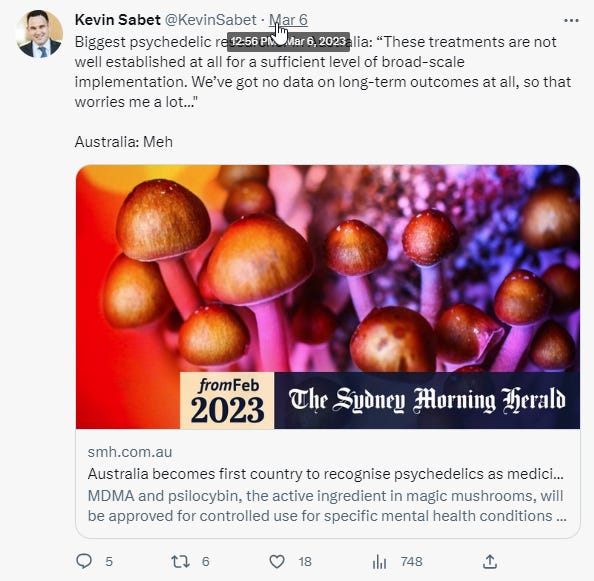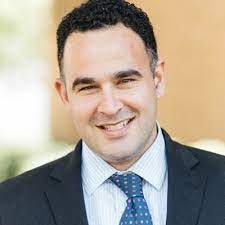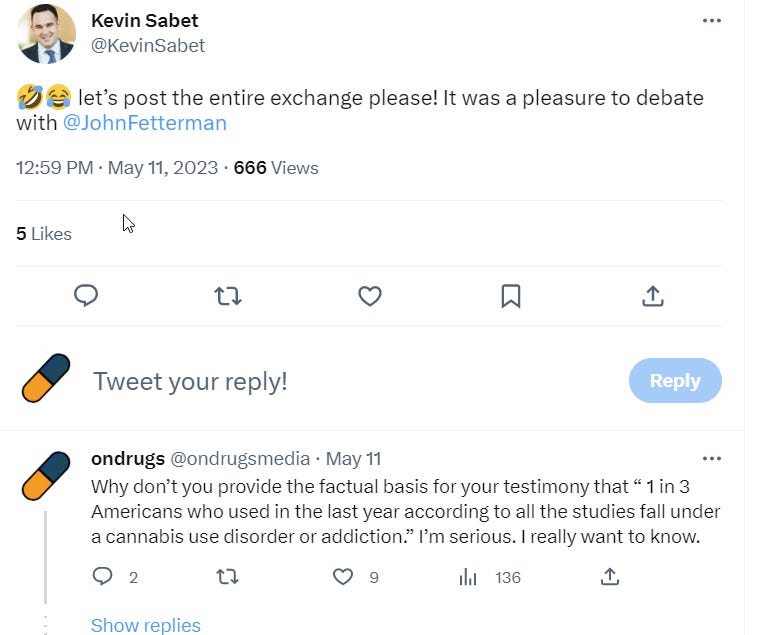Let me introduce you to Kevin Sabet, the face of prohibitionist drug policy.
A former official at the White House Office of National Drug Control Policy (ONDCP) during three U.S. Administrations (Obama, Bush, Clinton), Sabet once described himself as “[a]n internationally-recognized authority and entrepreneurial leader on drug programs, policy, and implementation, with wide-ranging, unmatched contacts at the local, state, national, and international levels.” He’s not wrong.
Sabet does not have a formal scientific education, but of course, neither do I. And like me, he is over-educated. He graduated Berkeley in 2001. Then, he got a doctorate from Oxford University (UK) in social policy as a Marshall Scholar. Pretty big deal. Sabet’s been involved in drug policy issues since high school. In short, Sabet—still in his mid-40s—has been in this business a long time and has worked pretty hard to get where he’s at today: at the tip-of-the-spear on drug policy debates, albeit on the prohibitionist side.
For the past decade, Sabet’s run Smart Approaches for Marijuana or SAM. Formed in 2013, SAM is the yang to the marijuana industry’s yin. Whenever and wherever marijuana legalization ends up on a ballot, Sabet and SAM (or a SAM chapter) show up to protest it, kind of like the Westboro Baptist Church of marijuana reform.
As of late, SAM hasn’t been too successful in this regard. In 2020, everywhere recreational marijuana appeared on the ballot, it passed. And yet, with far less money than his pro-marijuana counterparts in the aggregate, SAM gets some shit done—at least at the federal level.1 For example, SAM co-drafted the Medical Marijuana and Cannabidiol Research Expansion Act, a bill celebrated by everyone except Shane. For example, Shane wrote:
The bill gives DEA (via the AG) unbridled authority to avoid licensing any marijuana manufacturers at all simply by refusing to place a notice in the federal register seeking more applications. See Sec. 103.
Shane’s referring to a section of the new law that states:
As it relates to applications to manufacture marijuana for research purposes, when the Attorney General places a notice in the Federal Register to increase the number of entities registered under this chapter to manufacture marijuana to supply appropriately registered researchers in the United States, the Attorney General shall, not later than 60 days after the date on which the Attorney General receives a completed application
Guess what? 5 months+ after the President signed the Act and has the “Attorney General” published a notice in the Federal Register? Not that I’ve seen. Shane, take your victory lap!
But I digress.
SAM didn’t have a good 2020, but its mission continues and evolves. Just as the “legalization” non-profit industrial complex heads to newer drug frontiers, so has Sabet and his SAM crew. Sabet’s now turning up in debates and in the news commenting about psychedelics and other drugs. If you follow his Twitter feed, like I do, you’ll increasingly see tweet traffic about other drugs, including psychedelics.
And as of Spring 2022, he has a new non-profit from which to make these remarks: SAM 2: Electric Boogaloo Foundation for Drug Policy Solutions. New boss looks the same as the old boss. Different 501(c)(3), same Arlington address, same website design (layout, font, scheme), same staff…
And a new Leadership Council packed with prohibitionists, such as former DEA Administrator Michele Leonhart and current Chair of the D.A.R.E. Board of Directors—who once argued against marijuana legalization by testifying that it could harm dogs and was forced into retirement after DEA drug cartel-funded sex parties with prostitutes came to light under her watch.
As I mentioned above, I follow Sabet a bit. He is a good, coherent pulse as to where smarter prohibitionists stand. In that vein, last March, for 5£, I dialed into an online shindig with him, Matt Johnson, and Shayla Love. The event, entitled “The Debate: The psychedelic revolution,” disappointed insofar as it wasn’t much of a debate. The participants largely took mainstream, commonsense positions on psychedelics. Nothing controversial. And, I mostly agreed with them—including Sabet.
Now, as shown on the page for the debate, IAI holds out Sabet as a “Cross party drug policy expert.” Certainly, Sabet’s resume adequately supports that description.2 But in little time, expert Sabet made at two significant misrepresentations (that I was aware of).
The first had to do with Australia’s recent decision to reschedule MDMA and psilocybin. I forget exactly what he said, but something along the lines of claiming that Australia’s recent decision would result in widespread prescriptions of MDMA and psilocybin, even though neither drug had been approved by regulatory authorities. His statement was not true. Australia legalized medicalized MDMA and psilocybin, but the consequence of its decision will not result in availability even remotely approaching what would follow regulatory approval. There should not be widespread access.
The second item had to do with him representing that a study showed that around 39% of those seeking psilocybin for therapeutic purposes had a very challenging experience. Of course, I knew the study Sabet attempted to describe, a well-known study by Carbonaro et al. (2016). The survey didn’t purport to study psilocybin therapy, however, or those even those seeking out psilocybin to use therapeutically. Nor did it even purport to survey users of psilocybin. Rather, it was an “internet survey [ ] conducted of a large international sample of individuals who reported having had a difficult or challenging experience with psilocybin.”
During the debate, the forum asked for questions to ask of the panelists. I submitted one for Sabet: show us specifically where in the Australia decision there was anything that supported his statement about widespread access. The venue asked him the question—and Sabet dissembled. Because, of course, he couldn’t point to anything in the law that did what he said. Because it wasn’t true. Cross-examination is great. The harm reduction of truth.
Sabet revealed the basis for him making his statement. Had he read the law? No. Of course not. Turns out the source for his statement a story from the Sydney Morning Herald. That’s problematic enough. For a “drug policy expert” to rely on quotes in a newspaper article instead of looking at the law or decision itself is kind of incredible. But the article itself made clear that Australia wouldn’t be open season on MDMA and psilocybin prescriptions. Rather, “[p]sychiatrists will also first need to be approved by the TGA’s authorised prescriber scheme.” So, Sabet either read the Sydney Morning Herald article and misrepresented it; or he didn’t read the article. Either way, he was bullshitting, starting from a policy position and trying to work backwards by skimming headlines.
Even worse, as I was calling out his bullshit, in real time he retweeted the article that appeared to form the entire basis of his knowledge:

To be clear, I wasn’t shy about the confrontation. In the Q&A zoom that followed, I showed my face and explained to Sabet why I cared about his mistake. There’s a deluge of misinformation on both sides of the drug policy debate. How do we stick to facts? I specifically pointed out to him that what he had stated with respect to Australia was false. If my recollection serves me correctly, what followed was Sabet making some vague remark suggesting about keyboard warriors or internet troll behavior, dissembled some more, thanked me for my contribution, and dipped out. And he never really answered my question.
But my recall could be a bit fuzzy. I don’t have a recording, and I wasn’t taking notes.
Then, I forgot about the exchange. But fast forward to last week. More Sabet bullshit ends up on my radar. I virtually dropped in to the Senate Banking Committee hearings on SAFE Banking. Lo and behold, Sabet is testifying. (But guess who didn’t have much testimonial presence on banking in the marijuana industry? The marijuana industry.)
Amidst the jibber-jabber, Sabet said something that caught my attention:
1 in 3 Americans who used in the past year, according to all the studies, fall under what we call a cannabis use disorder or addiction.
Hear it yourself:
This particular statement that drew my attention ties back to the March 6 episode regarding Australia. Immediately after Sabet tweeted out the Australia article in March, he retweeted a Wall Street Journal article:
That 3 in 10 statistic appears to be the source of his statement to Congress. But I’m not aware of a study that supports the statement Sabet made let alone “all the studies” as he testified. So, multiple times on Twitter, I have asked Sabet for substantiation:
I’m getting crickets. Kevin, if you are reading this, I still want to know.
Since he isn’t biting, let’s assume the factual basis for his statement is a study on CDC’s website described as “recent”—a good bet given his written testimony. Look at footnote 2 in the references. You’ll see a full cite to the “recent” study:
S. Hasin et al., “Prevalence of Marijuana Use Disorders in the United States Between 2001–2002 and 2012–2013,” JAMA Psychiatry, vol. 72, no. 12, pp. 1235–1242, 2015.
Personally, I don’t consider a 2015 paper considering data from the decade prior to be “recent.” Do you? Nor does it support Sabet’s precise testimony as he worded it. The paper concludes, “nearly 3 of 10 marijuana users manifested a marijuana use disorder in 2012–2013.” This statement, as I read it, does not reflect “Americans who used cannabis in the past year.” Rather, it appears to describe how many folks have addiction issues among marijuana users. And of course, is one study “all the studies”? I’ll let you decide. If there were only one, maybe one study could be all the studies.
Providing accurate or candid metrics wouldn’t have been hard. No ChatGPT needed. A simple PubMed query works, for example:
2021 study: “Cannabis use disorder (CUD) is an underappreciated risk of using cannabis that affects ~10% of the 193 million cannabis users worldwide.”
My favorite is this one, a 2020 meta-analysis that pegs CUD among people who used cannabis at around 22%.
Now, all this may seem ticky-tacky. We all make mistakes. And the more we write and say, the more mistakes we make.
But words matter. Precision is important. People rely on what we represent. And serious scientists or policy experts—let alone those testifying to Congress—shouldn’t rely on newspapers headlines or a line on CDC’s webpage without reading the source material. Words change substance. The difference between “marijuana users” and those “who used in the past year” isn’t poor phrasing. It is a distinction with a difference. It is similar to the difference between assessing how many folks that regularly drink alcohol become alcoholics versus assessing the number of alcoholics out of those that have had at least one drink in the past year.
Conclusion — and Pivot
As you can tell, yours truly is not the biggest Sabet fan. Nothing personal. Everyone makes mistakes. But people should own up to mistakes. And folks who don’t present data/statistics/research/law/etc. accurately with more than a sporadic frequency aren’t my cup of tea. It doesn’t matter what side of the drug policy one is on; indeed, the same principle applies outside drug policy.
But want to know something wild? At bottom, despite misrepresentations, mischaracterizations, and whatnot, from small to big items, I often find myself getting to the same bottom-line as Sabet.
Start with a small one: second-hand inhalation. NYC, want to get a handle on that? When I do my 9 AM bagel, coffee, and Pilates run, I don’t need dank wake ‘n bake billowing into my nostrils ruining my roll-overs. Sabet’s also got a point, in my view, about the industry not giving a shit (or enough of a shit) about social justice. I even agree with the way he often speaks about drug policy issues, such as here. Always speaking about issues through the War on Drugs lens is often not productive, and it is important to speak in precise terms about policies and objectives.
Increasingly, Sabet’s criticisms about why some folks want legalization and policies enacted toward that end merit harder looks. In that spirit, I’m making a pivot to another area where I seem to agree with some of Sabet’s positions near the bottom-line, albeit for different, non-prohibitionist rooted reasons.
The author here attributes Sabet as saying that Oregon 109 treats Oregon citizens like “lab rats.” Is he right?
My next essay series, called Oregonized Crime, will take a critical look through the lens of the law. These essays will ask and attempt to answer some fairly pointed questions. Specifically, they will dive into a fundamental question in today’s drug policy debate: whether the Oregon 109 “psilocybin services” regime can deliver psilocybin therapy in a state-regulated but less expensive or more "equitable" manner when compared to an FDA approved therapy, as some promised.3
My answer is no. The current (and future) issues with Oregon 109 and “psilocybin services,” such as 280E, are serious—and incurable. Any lawyer with knowledge of the relevant regulatory background could and should have foreseen these issues.
Until next time.
And btw, federal law still prohibits marijuana.
Especially if tweets is a barometer of expertise. Going back to August 2011, Sabet has 16,000 of them, averaging between 3 and 4 tweets a day.
To be clear, I will not attempt to prove whether a “psilocybin services” measure can provide psilocybin or psychedelic therapy or services on different terms. That should be obvious: of course it can. But as much as I am critical of the FDA system, different is not better if the system is not capable of produce better access or outcomes for consumers. After all, not every novelty is useful or beneficial.









I write a lot about 'Cannabis Use Disorder' and how the numbers were inflated (up to and including the 30% number you cite...) in my new book 'Seeing Through the Smoke'; they rope in all the medical cannabis patients by including 'tolerance' and 'withdrawal' -- it's written to be extremely inclusive (and inflationary...). - Dr. G.
It's a classic revolving-door lobbying scam.
He spent $100K on lobbying in 2020: https://www.opensecrets.org/orgs/smart-approaches-to-marijuana/lobbying?id=D000097890
Who funds him? Answer that question, and we could see the whole picture.
But Sabet's been hiding the source of his funding for years.
Excellent analysis here by Diane Goldstein, a 20-year veteran of the Redondo Beach Police Dpt.
https://filtermag.org/marijuana-prohibition-taxpayer-funding/
But who funds him?